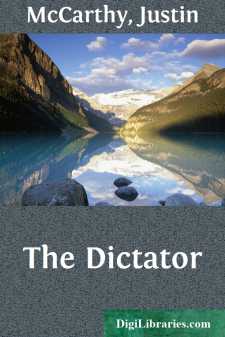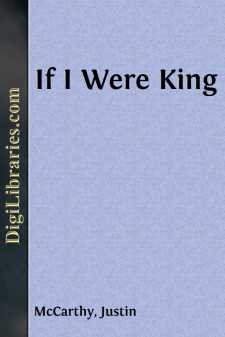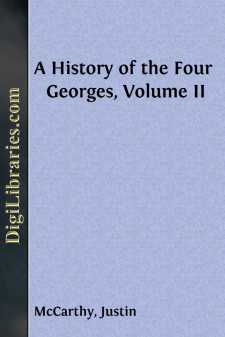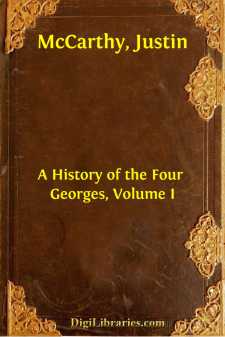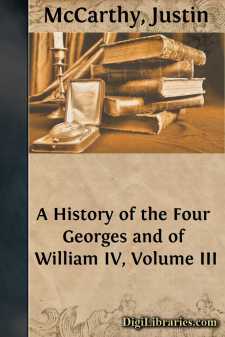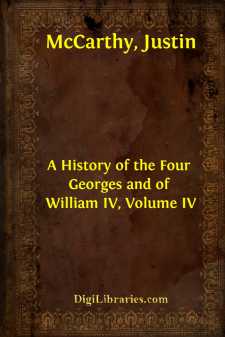Categories
- Antiques & Collectibles 13
- Architecture 36
- Art 48
- Bibles 22
- Biography & Autobiography 813
- Body, Mind & Spirit 142
- Business & Economics 28
- Children's Books 17
- Children's Fiction 14
- Computers 4
- Cooking 94
- Crafts & Hobbies 4
- Drama 346
- Education 46
- Family & Relationships 57
- Fiction 11829
- Games 19
- Gardening 17
- Health & Fitness 34
- History 1377
- House & Home 1
- Humor 147
- Juvenile Fiction 1873
- Juvenile Nonfiction 202
- Language Arts & Disciplines 88
- Law 16
- Literary Collections 686
- Literary Criticism 179
- Mathematics 13
- Medical 41
- Music 40
- Nature 179
- Non-Classifiable 1768
- Performing Arts 7
- Periodicals 1453
- Philosophy 64
- Photography 2
- Poetry 896
- Political Science 203
- Psychology 42
- Reference 154
- Religion 513
- Science 126
- Self-Help 84
- Social Science 81
- Sports & Recreation 34
- Study Aids 3
- Technology & Engineering 59
- Transportation 23
- Travel 463
- True Crime 29
Justin McCarthy
Justin McCarthy (1830-1912) was an Irish nationalist politician, historian, and novelist. He served as a Member of Parliament and was an influential figure in the Irish Home Rule movement, advocating for self-government for Ireland. McCarthy authored several historical works, including a multi-volume "History of Our Own Times," and various novels, blending his political insights with literary talents.
Author's Books:
Sort by:
by:
Justin McCarthy
AN EXILE IN LONDON The May sunlight streamed in through the window, making curious patterns of the curtains upon the carpet. Outside, the tide of life was flowing fast; the green leaves of the Park were already offering agreeable shade to early strollers; the noise of cabs and omnibuses had set in steadily for the day. Outside, Knightsbridge was awake and active; inside, sleep reigned with quiet. The...
more...
by:
Justin McCarthy
CHAPTER I IN THE FIRCONE TAVERN In the dark main room of the Fircone Tavern the warm June air seemed to have lost all its delicacy, like a degraded angel. It was sodden through and through, as with the lees of wine; it was stained and shamed with the smells of hams and cheeses; it was thick and heavy as if with the breaths of all the rogues and all the vagabonds that had haunted the hostelry from its...
more...
by:
Justin McCarthy
BOLINGBROKE ROUTED AGAIN. While "the King's friends" and the Patriots, otherwise the Court party and the country party, were speech-making and pamphleteering, one of the greatest English pamphleteers, who was also one of the masters of English fiction, passed quietly out of existence. On April 24, 1731, Daniel Defoe died. It does not belong to the business of this history to narrate the...
more...
by:
Justin McCarthy
CHAPTER I. "MORE, ALAS! THAN THE QUEEN'S LIFE!" "The Queen is pretty well," Swift wrote to Lord Peterborough on May 18, 1714, "at present, but the least disorder she has puts all in alarm." Swift goes on to tell his correspondent that "when it is over we act as if she were immortal; neither is it possible to persuade people to make any preparations against an evil...
more...
by:
Justin McCarthy
"SUPREME IRONIC PROCESSION." For six and forty years England had been ruled by German princes. One Elector of Hanover named George had been succeeded by another Elector of Hanover named George, and George the First and George the Second, George the father and George the son, resembled each other in being by nature German rather than English, and by inclination Electors of Hanover rather than...
more...
by:
Justin McCarthy
"OPENS AMID ILL OMENS." The closest student of history would find it hard indeed to turn to the account of any other royal reign which opened under conditions so peculiar and so unpropitious as those which accompanied the succession of George the Fourth to the English throne. Even in the pages of Gibbon one might look in vain for the story of a reign thus singularly darkened in its earliest...
more...


